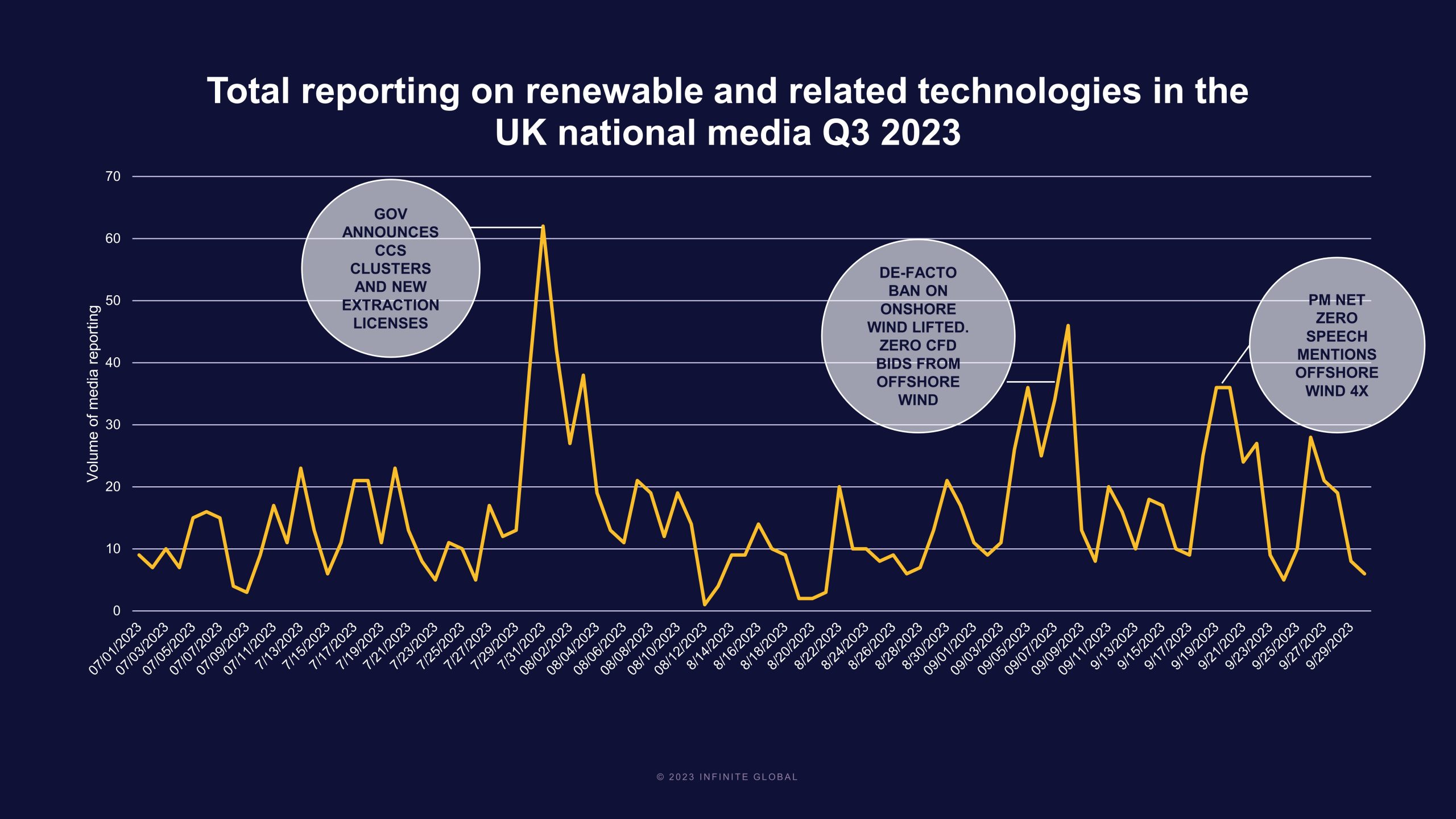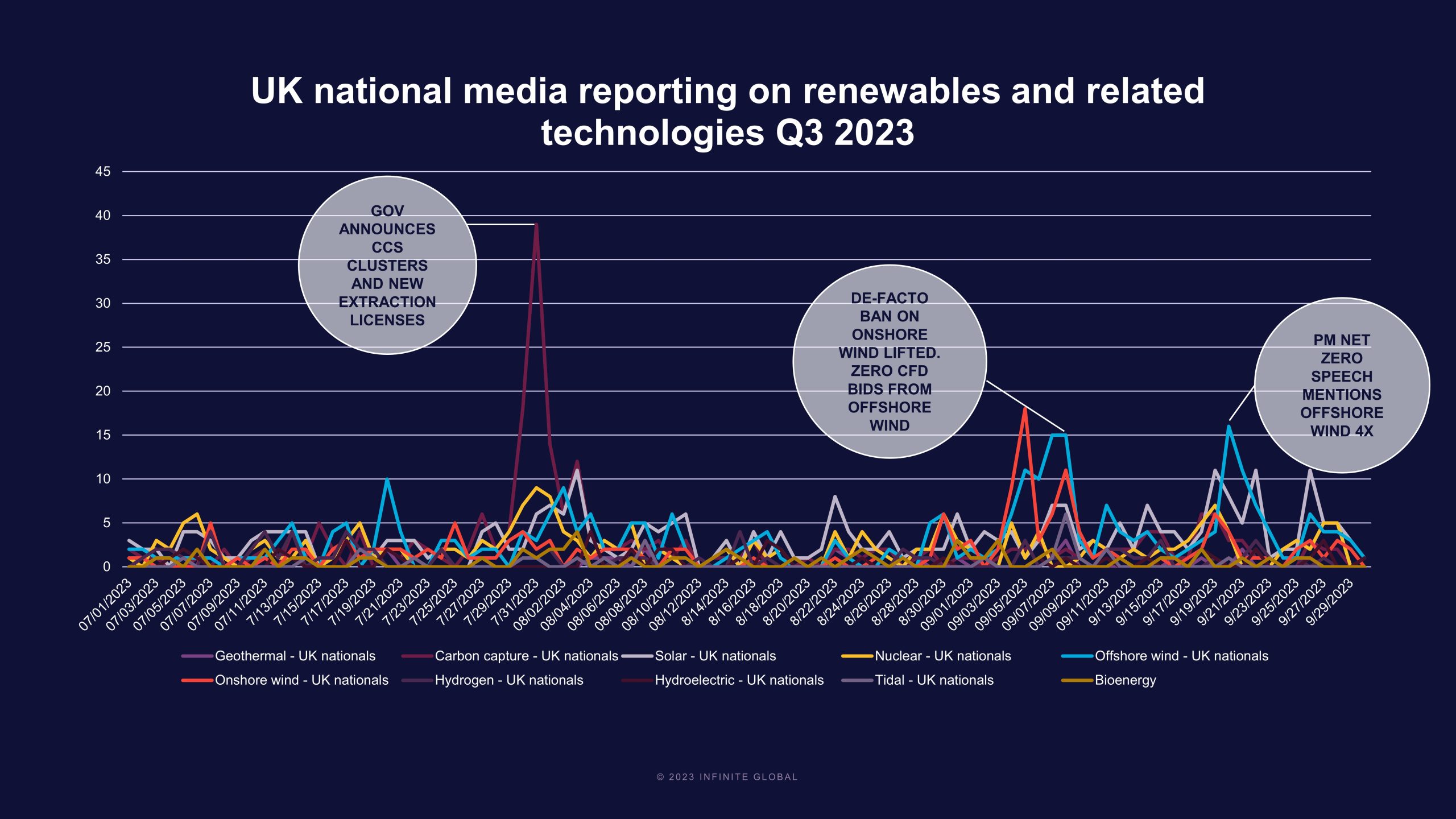Renewable energy in the UK media Q3 2023: A “bruising summer”?
October 31, 2023
The energy transition and net zero mission is now a mainstay of news headlines and airwaves.
Rarely a day goes by without there being a significant development that moves the agenda forwards (or, in some cases, backwards…), with the international media continuing to play a key role in shaping awareness of, demand for, and trust in renewables, and other technologies, that will be central to meeting our shared climate goals and delivering a low carbon future.
Reporting on renewables
Back in July of this year, Infinite Global published a new report exploring the trends in media reporting relating to a selection of such technologies, covering 2019 through to the end of H1 2023. You can explore that data here.
What was clear from this data was that media reporting on renewables has been on an upward trajectory for a number of years. There is clear appetite from the media for such stories (not least given increasing public interest in climate change issues, and the increasing prominence of the energy transition on the political / policy agenda).
Q3 2023 has continued this trend. Overall volumes of media reporting in the UK mainstream / national press on the analysed technologies grew by around 15% in Q3 compared to Q2.
Q2 had seen a considerable drop, the first real drop since Q1 2022 – which itself was more of a correction, following a major surge in reporting in Q4 2021 relating to the UK’s hosting of COP26.
With the COP events generally creating an upsurge in media reporting we would expect Q4 2023 to continue with this upward trend.
A deeper dive into the reporting itself, though, tells a more nuanced story.
Renewables and low carbon technologies certainly regained their media prominence in Q3 (with solar continuing to be the highest profile overall with a 22% ‘share of voice’), but this was to a large extent driven by divisive government policy announcements – as can be seen by the three major spikes in reporting over the period.

The government announces extraction licences and CCS clusters
Firstly, media reporting in relation to renewables and associated technologies hit their high point (almost 300% higher than the average day in the quarter) for Q3 at the end of July, driven by far higher than usual mentions of carbon capture technology.
This came as a result of news that the government would be issuing new licenses for North Sea oil and gas extraction as part of the UK’s strategy to become more energy independent (government announcement here). Alongside this news (which saw widespread negative reaction), the government also announced carbon capture clusters in Scotland and Humber, while Prime Minister Rishi Sunak had to face up to media scrutiny to defend the licenses as “entirely consistent” with the UK’s net zero commitments.
Amendments to the Energy Bill relax restrictions on onshore wind
A second spike occurred in early September (almost 200% higher than the daily average), with reporting in relation to onshore wind hitting a high point for the quarter (we reflected on the media landscape for onshore wind here).
This followed another announcement by the Prime Minister, after the government acquiesced to pressure from a group of Conservative back benchers, led by former COP26 president Sir Alok Sharma, and lifted the ‘de facto ban’ on onshore wind development with relaxations to the planning process in the Energy Bill. The Bill (available to view here) received Royal Assent at the end of October.
A few days later overall volumes of reporting surged even further (although no single energy or technology spiked higher that week than onshore wind). This followed the government’s Contracts for Difference auction receiving zero bids from the offshore wind industry – in what was described as a “major blow for consumers” by Renewable UK and was followed by serious circumspection in the press regarding the UK’s renewable energy targets.
Rishi Sunak’s net zero speech and the reality check for renewables
The third spike (around 130% higher than the daily average) was again triggered by an announcement from Number 10, which, for many, did little to arrest the sliding confidence in the renewables industry.
On the 20th of September, Rishi Sunak delivered his speech on Net Zero (available to read in full here). This speech, and its announcements, resonated even further than those previously mentioned – but this translated into a smaller uptick for coverage of specific renewables, partly because the Prime Minister didn’t speak too much about specific technologies, with his focus more on broader policies and targets. Offshore wind featured only four times in the speech, but even this was more than any other technology (solar wasn’t mentioned at all). Coupled with the result of the CfD auction, this saw a surge in media scrutiny into the industry and its viability in the UK.

Confidence dented in run up to COP28?
Even before the Prime Minister’s speech, the FT labelled it a ‘bruising summer’ for Britain’s net zero targets.
The energy transition of course brings huge commercial opportunities, but the scope of this is fundamentally tied to the policy environment.
The developments over Q3 have dented confidence – Renewable UK called for new policies to restore it after the 20th September speech – and this brings communications challenges as businesses in the sector pivot to respond to new (and potentially more challenging) operating conditions and to demonstrate leadership and ‘climate credentials’ to stakeholders.
This of course is not limited to renewables companies themselves, but any organisation which is undergoing decarbonisation (just look at the media statement put out by the likes of the Society of Motor Manufacturers and Traders).
There are other challenges too of course.
From rising reports of solar panels catching fire (The Independent, 16 September) to a slowing market for electric vehicles driven by cost concerns and lack of suitable infrastructure (The Times, 19 September), there are significant operational challenges affecting the energy transition. And needless to say, the media would not be doing its job if these were left unreported.
This all means that companies right across the clean energy industry (producers, suppliers, service providers, manufacturers and more) must be prepared to respond to scrutiny with effective communications. The ‘moral high ground’ isn’t enough.
Likewise, the independent media plays an essential role in combatting misinformation (Donald Trump’s claims in relation to offshore wind turbines killing whales is a case in point – BBC, 26 September), as do communications which focus on practical use cases and the adaptations that companies, and individuals, can successfully make today.
As we head closer to COP28 and a period where we are likely to see rising media focus on net zero, and ever closer examination of what policy makers, and private enterprises, are doing with respect to addressing the threat of climate change, brands should take note. Net zero is a critical reputation issue and must be treated as such.
Read more like this
How can we help?
Get in touch with our team



